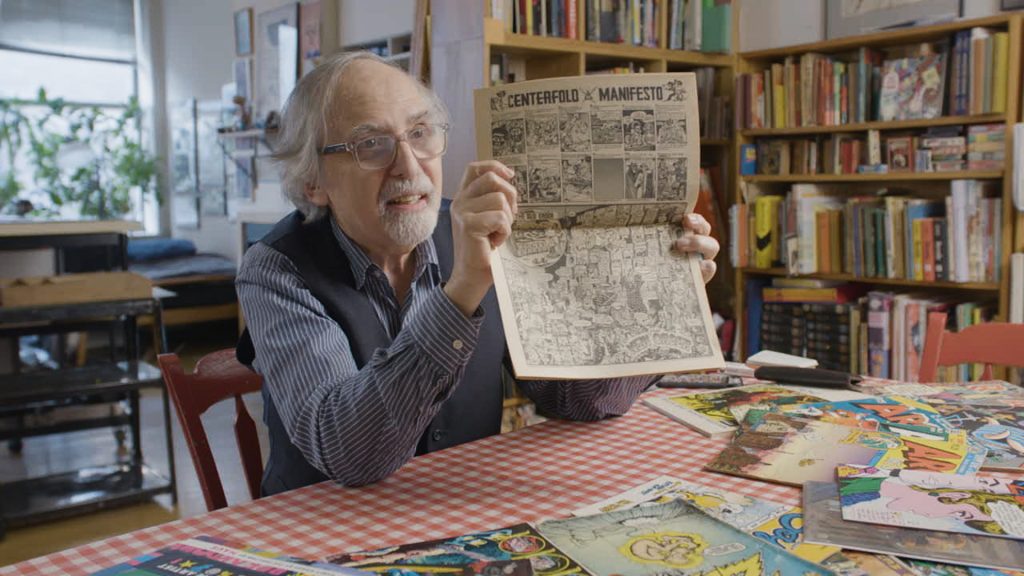Two Documentaries Offer Lessons in Fame
Films about Art Spiegelman and Gallagher are very different and worth seeing.
In its comprehensive and exhaustive online guide, the Milwaukee Film Festival itself makes thematic connections for patrons among its nearly 200 films and ample short subjects being screened from April 24 to May 8. But a reviewer picking through the offerings can make his own thematic connections that may interest patrons.
I stumbled across one – call it the high and low of media celebrity — connecting two documentaries. One elevates to international applause a visual artist best known for, of all things, comic books. The other documentary reveals and laments the recent death of the nation’s most wildly successful standup comic of the 1980s who faded into obscurity and criticism as a racist before his death three years ago.
The second is the sad journey to oblivion of a stage comedian who was quick-witted, innovative and huge in box office. His gifts also led to his disintegration, chronicled in Gallagher, a documentary in which director Josh Forbes inserts himself, sometimes for the good, in searching for how the No. 1 comedian of the 1980s descended into a sick old man facing claims that he was racist and out of touch.
Both films say something meaningful about the price — and the vagaries — of fame.
Spiegelman, now 77, was noted among his colleagues as a young talent. But it was years before he became recognized as an innovative artist, playing with pencils, color, ink and even wooden cutouts to explore his own demons and deepen the pulp and paper medium he had chosen.
While most comic books were joke or adventure strips, he was drawn to the world of underground comics (often called comix to differentiate his Raw from the popular Marvel monthlies or the daily newspaper cartoon images), with darker lines and themes, peopled by sometimes grotesque monsters (alongside the horror comics that children back into the 1950s secretly devoured).
What few realized was how Spiegelman was toying with perspective, using cinematic techniques (a distant figure, jumps into a closeup, which jumps into a middle finger to tell a story), unusual angles and shaded charcoal lines to convey mood and story.
Itzhak Avraham ben Zeev Spiegelman (as Art was born) went through many phases as a talented artist, from Topps trading cards to Mad magazine, from playing with hues to succumbing to a nervous breakdown and LSD (areas the documentary glances over since he quickly recovered as an artist and a wit).
What broke out into fame was Maus: A Survivor’s Tale, serialized from 1980 to 1991. It is best known today as a graphic novel, but it was also a comic strip and has multiplied into a bestseller including a multi-media version.
Raised in a family that re-lived the Holocaust in its memories, Art casts the family in personal terms as a family of mice with Hitler and his minions as cats – and all that over decades of success turned him into a noted anti-Fascist speaker and voice of the Holocaust, adding many awards and tributes for Art and his wife, noted designer and editor Françoise Mouly.
The documentary was actually a revelation for me though I have followed all sorts of cartoon artistry over decades. But directors Molly Bernstein and Philip Dolin have found basic but striking ways to expose the quality and rubbed-in technique of the artistry, reminding me that, while paper is a flimsy medium, the thought and humanity involved are worth generations of studying (I treated this cartoon world too casually and speedily in my youth).
As Maus continues to prove, in both its family stories and ugly images of Nazi power, flimsy is not Spiegelman. He is well worth honoring and savoring, a case where the subject elevates the documentary style.
Gallagher is about a comic who is more difficult to savor. In the middle of the documentary, we come to recognize his intellect and inventiveness in creating stage contraptions. But first we see him as the most successful yet most forgotten stage comedian of the 1980s. He was everywhere in Showtime specials and auditorium sellouts, with audiences clamoring for him to sledgehammer a watermelon (sometimes other fruits), splattering the audience with seeds and generally soaking them to their great delight (it was a different era for audiences, too).
Leo Gallagher was best known as a “prop comedian,” wheeling out on roller skates or on a bike with a square wheel, having little critters chase each other on the rim of his hat or bouncing around on a giant sofa. Only later in the documentary do we discover he was a manic writer, and pretty darn good at one-liners.
Those one-liners were not his road to success, though he videoed himself long before it was fashionable. Almost all the enduring successful comedians of that era (Letterman, Leno, Seinfeld) could best be described as monologists, but Gallagher was famous for his gimmicks. Other comedians like Howie Mandel are interviewed detailing his warts and his gifts.
Like Spiegelman, Leo Gallagher was interested in comic books and visual tricks, but in the annals of fame Leo is no lion. Comedy always has elements of cruelty. But while Spiegelman became famous in his drawings for exposing the cruelty of the Holocaust, Gallegher continued well after his fame to make racist jokes at the expense of Mexicans, lesbians and sometimes his audiences.
He also had family issues – including a look-alike brother who also performed as “Gallagher” – but his self-loathing may also have been part of his decline, suggests documentary maker Josh Forbes. He became a forgotten footnote after making (and losing) millions on the road. This journey makes much of the tale a sad documentary, which is an interesting twist to what audiences will expect about a comedian.
Gallagher will be shown at 8 p.m. on Sunday April 27, at the Oriental Theater’s Abele Cinema, then at 9:30 p.m. Tuesday, April 29, at the Downer Theater, and at 9 p.m. Wednesday April 30 at the Downer.
Dominique Paul Noth served for decades as film and drama critic, later senior editor for features at the Milwaukee Journal. You’ll find his blog here and here.
If you think stories like this are important, become a member of Urban Milwaukee and help support real, independent journalism. Plus you get some cool added benefits.
Movies
-
Republican Legislators Push Tax Credits for Films Made in Wisconsin
 May 21st, 2025 by Baylor Spears
May 21st, 2025 by Baylor Spears
-
Mystery Movie Being Filmed in Milwaukee With Kevin Spacey
 Apr 24th, 2025 by Jeramey Jannene
Apr 24th, 2025 by Jeramey Jannene
-
‘The Dells’ Is A Canny, Very Wisconsin Docu-Film
 Apr 17th, 2025 by Dominique Paul Noth
Apr 17th, 2025 by Dominique Paul Noth





















